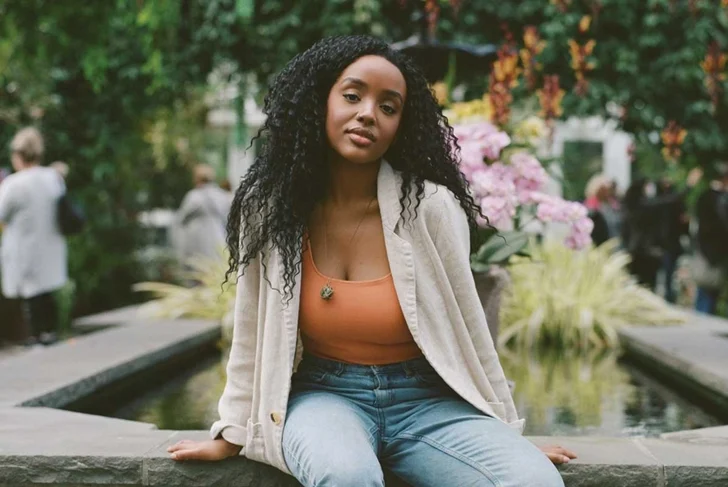Redefining Environmentalism: Wanjiku Gatheru and the Movement for Inclusive Climate Justice
Long before Wanjiku “Wawa” Gatheru became a national voice in the environmental movement, she was simply a child with dirt on her hands, gardening beside her mother and grandmother in the rural “Quiet Corner” of Northeastern Connecticut. The daughter of Kenyan immigrants, Gatheru came from a long line of farmers—a lineage that rooted her deeply in the land, even if she didn’t always recognize it as environmentalism.
Like many young people of color, Gatheru once believed that the environmental movement was reserved for the elite: the hikers, the Patagonia-clad adventurers, and the well-resourced few. “I thought that being an environmentalist meant you were really wealthy,” she recalls, “and that you went hiking and wore Patagonia—a lot of things my family couldn’t afford or activities that we weren’t engaged with.”
It wasn’t until a high school environmental science class introduced her to the concept of environmental justice that her perspective shifted. For the first time, the climate crisis felt immediate—personal. “That class really changed my framing,” Gatheru says. “I realized that if I wanted to do any kind of social-impact work, I’d have to start with climate.”
Climate Inequality and the Missing Voices
Gatheru’s realization wasn’t just about science—it was about justice. The deeper she looked, the more clearly she saw how disproportionately climate change affects Black communities. And not just in theory.
A 2018 study from the American Journal of Public Health found that Black individuals in the U.S. are exposed to 1.54 times more particulate pollution—harmful substances like soot and industrial smoke—than the general population. Black Americans are also far more likely to live near coal plants, oil refineries, and other polluting industries, often in “fence-line communities” where environmental hazards are part of daily life.
These environmental burdens have real consequences: elevated rates of asthma, heart disease, and other chronic illnesses. For Black women and girls, the effects are compounded by the dual pressures of racial and gender-based discrimination.
“Women in general bear the brunt of the climate crisis,” Gatheru explains, “and for Black and Indigenous women, that’s layered with the legacy of systemic racism, colonialism, and patriarchal structures.”
And yet, while these communities are often on the frontlines of climate impacts, they remain largely absent from leadership in the environmental movement. In 2021, only 138 Black women earned degrees in environmental science, compared to nearly 3,000 white women and over 2,200 white men. People of color make up close to 40% of the U.S. population, but represent less than 16% of staff at environmental organizations—a disparity known as “the green ceiling.”
Changing the Narrative: The Birth of Black Girl Environmentalist
Faced with these realities, Gatheru felt overwhelmed. How was it possible, she wondered, that something so urgent—so clearly intertwined with racial justice—was still seen through such a narrow lens?
She decided to do something about it.
In response, she founded Black Girl Environmentalist (BGE), a nonprofit dedicated to creating space for Black girls, women, and gender-expansive individuals in the climate movement. For Gatheru, the goal was both personal and systemic: to change who gets seen as an environmentalist, and who gets to lead.
“You could Google ‘environmentalist’ and you’re not going to see someone who looks like me,” she says. “That’s not necessarily wrong—but it’s incomplete. We’re working to expand that narrative.”
BGE’s approach is threefold:
- Green Workforce Development: Creating entry points for young Black individuals into climate-related careers through internships, training, and mentorship.
- Community Empowerment: Hosting events—both online and in-person—that help participants connect, collaborate, and build solidarity.
- Narrative Change: Shifting public perception of what environmentalism looks like, sounds like, and includes.
Building a Pathway for the Future
From paid internship programs like the Hazel M. Johnson Fellowship to the nationwide HUB initiative, which brings local chapters together in cities across the U.S., BGE offers tangible tools and safe spaces for young climate leaders to grow.
The impact reaches beyond career pathways. For many, BGE is a balm for the growing mental toll of climate anxiety—a phenomenon particularly affecting young people. Gatheru emphasizes that collective action can be a powerful antidote.
“One of the best ways to work through climate anxiety is to recognize it and build community through action,” she says. “When we come together, we build collective power—and with that, the ability to transform our communities and influence the future.”
At its core, BGE isn’t just about representation. It’s about reclaiming the deep and often erased legacy of environmental leadership within Black communities—and ensuring that legacy is recognized, celebrated, and expanded.
“My goal,” Gatheru says, “is to ensure the wider environmental movement acknowledges that Black women and women of color have always been essential to this work. Through BGE, I’m doing my part to nurture the next generation of climate leaders—people who have long been poised to lead but haven’t been fully seen as stakeholders.”
A New Vision for the Climate Movement
Wanjiku Gatheru’s story is more than a personal journey—it’s a reflection of a larger, necessary shift in how we define and pursue environmental justice. Through Black Girl Environmentalist, she’s helping rewrite the narrative of who belongs in the movement and whose voices matter.
Her work reminds us that climate change is not just about melting ice caps or endangered species—it’s about people. It’s about communities breathing dirty air, neighborhoods flooded by rising waters, and generations of leaders left out of the conversation.
And it’s about a new generation—resilient, diverse, and determined—stepping forward to say: we’re here, we’ve always been here, and we’re ready to lead.

